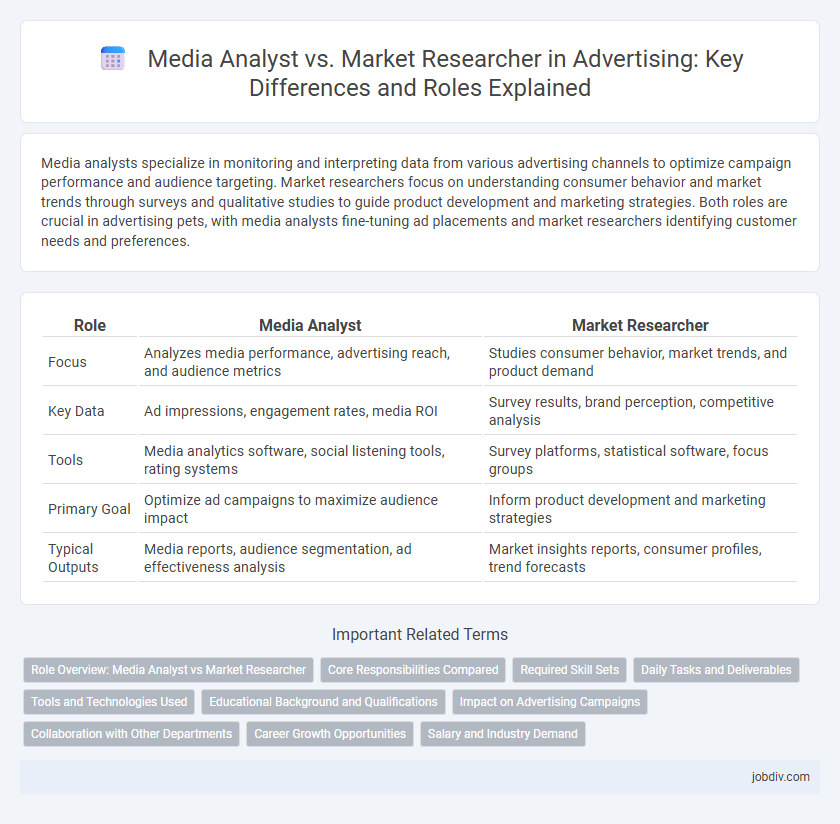Media analysts specialize in monitoring and interpreting data from various advertising channels to optimize campaign performance and audience targeting. Market researchers focus on understanding consumer behavior and market trends through surveys and qualitative studies to guide product development and marketing strategies. Both roles are crucial in advertising pets, with media analysts fine-tuning ad placements and market researchers identifying customer needs and preferences.
Table of Comparison
| Role | Media Analyst | Market Researcher |
|---|---|---|
| Focus | Analyzes media performance, advertising reach, and audience metrics | Studies consumer behavior, market trends, and product demand |
| Key Data | Ad impressions, engagement rates, media ROI | Survey results, brand perception, competitive analysis |
| Tools | Media analytics software, social listening tools, rating systems | Survey platforms, statistical software, focus groups |
| Primary Goal | Optimize ad campaigns to maximize audience impact | Inform product development and marketing strategies |
| Typical Outputs | Media reports, audience segmentation, ad effectiveness analysis | Market insights reports, consumer profiles, trend forecasts |
Role Overview: Media Analyst vs Market Researcher
Media Analysts specialize in analyzing advertising performance metrics, audience engagement, and media channel effectiveness to optimize campaign strategies and maximize ROI. Market Researchers focus on gathering and interpreting consumer behavior data, market trends, and competitive intelligence to inform product development and marketing plans. Both roles require strong analytical skills, but Media Analysts concentrate on media-specific data, while Market Researchers address broader market insights.
Core Responsibilities Compared
Media Analysts specialize in evaluating media performance by analyzing advertising reach, engagement metrics, and channel effectiveness to optimize campaign strategies. Market Researchers focus on gathering and interpreting consumer insights, market trends, and competitor data to guide product development and positioning. Both roles rely on data analysis but differ in scope, with Media Analysts concentrating on media impact and Market Researchers addressing broader market dynamics.
Required Skill Sets
Media analysts require strong data interpretation skills, proficiency in using analytics tools like Google Analytics and social media insights, and an understanding of advertising metrics such as CPM and CTR. Market researchers must excel in survey design, statistical analysis software like SPSS or R, and qualitative research methods to uncover consumer behavior patterns. Both roles demand critical thinking and effective communication skills for translating data into actionable advertising strategies.
Daily Tasks and Deliverables
Media analysts focus on monitoring, analyzing, and interpreting data from various advertising channels to optimize campaign performance, producing reports on audience engagement, media spend efficiency, and channel effectiveness. Market researchers gather and analyze consumer behavior data through surveys, focus groups, and market trends to generate insights that inform advertising strategies, delivering comprehensive reports on customer preferences, competitive analysis, and market segmentation. Both roles provide actionable data but media analysts emphasize real-time media metrics, whereas market researchers concentrate on deeper consumer insights and long-term market trends.
Tools and Technologies Used
Media analysts utilize advanced analytics platforms like Google Analytics, Adobe Analytics, and social listening tools such as Brandwatch to track and interpret consumer engagement across digital channels. Market researchers rely heavily on survey software like Qualtrics, FocusVision, and statistical tools including SPSS and R to gather and analyze primary data for demographic insights and market trends. Both professionals integrate CRM systems and big data technologies to refine targeting strategies and optimize advertising effectiveness.
Educational Background and Qualifications
Media analysts typically possess degrees in communications, media studies, or journalism, emphasizing skills in data analysis and media metrics. Market researchers often hold qualifications in marketing, statistics, or business administration, with strong expertise in consumer behavior and quantitative research methods. Both roles require proficiency in analytics software, but media analysts focus more on media consumption patterns while market researchers delve into broader market trends and customer insights.
Impact on Advertising Campaigns
Media analysts optimize advertising campaigns by analyzing audience data, media consumption patterns, and ad performance metrics to identify the most effective channels and timing for ad placements. Market researchers provide insights into consumer behavior, preferences, and competitive landscape, helping advertisers tailor messages and product positioning to target demographics. Both roles significantly enhance campaign ROI, with media analysts focusing on tactical media buying decisions and market researchers driving strategic campaign development.
Collaboration with Other Departments
Media Analysts collaborate closely with marketing, sales, and creative teams to optimize campaign reach and ensure accurate data interpretation. Market Researchers work alongside product development, finance, and customer service departments to gather consumer insights and inform strategic decisions. Both roles require cross-departmental collaboration to align advertising strategies with business goals and consumer needs.
Career Growth Opportunities
Media Analysts specialize in evaluating advertising performance across channels, gaining expertise in digital metrics and audience behavior that drives high demand in marketing agencies. Market Researchers focus on consumer insights and competitive analysis, leveraging data to guide product development and strategic decisions, often leading to roles in brand management and consulting. Career growth for Media Analysts typically advances into media planning and campaign strategy, while Market Researchers often progress toward leadership in market intelligence and business analytics.
Salary and Industry Demand
Media Analysts earn a median salary of approximately $65,000 annually, with growth driven by digital advertising trends and data analytics demand. Market Researchers command higher salaries, averaging around $75,000, due to their expertise in consumer behavior and competitive analysis across multiple industries. Both roles see increased demand in marketing, advertising agencies, and corporate sectors, but Market Researchers typically enjoy broader industry opportunities and salary growth potential.
Media Analyst vs Market Researcher Infographic

 jobdiv.com
jobdiv.com